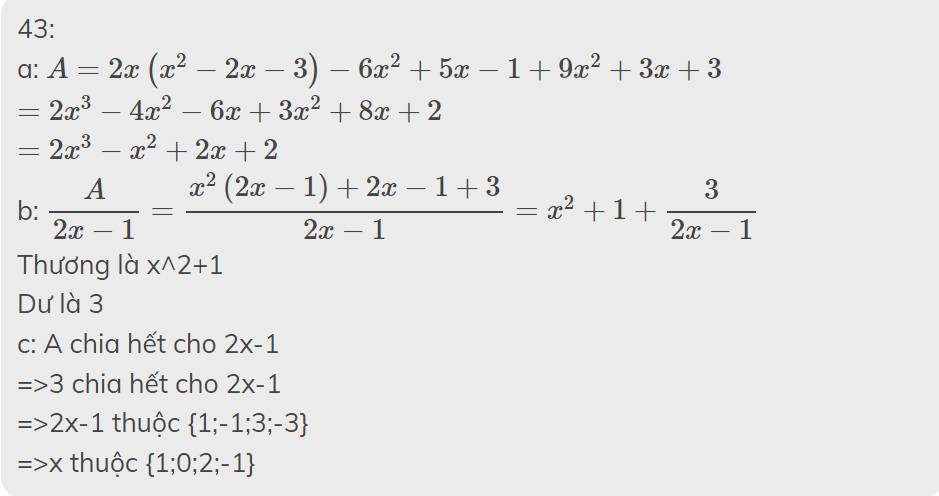Hãy nhập câu hỏi của bạn vào đây, nếu là tài khoản VIP, bạn sẽ được ưu tiên trả lời.

bài 1 :
B=15-3x-3y
a) x+y-5=0
=>x+y=-5
B=15-3x-3y <=> B=15-3(x+y)
Thay x+y=-5 vào biểu thức B ta được :
B=15-3(-5)
B=15+15
B=30
Vậy giá trị của biểu thức B=15-3x-3y tại x+y+5=0 là 30
b)Theo đề bài ; ta có :
B=15-3x-3.2=10
15-3x-6=10
15-3x=16
3x=-1
\(x=\frac{-1}{3}\)
Bài 2:
a)3x2-7=5
3x2=12
x2=4
x=\(\pm2\)
b)3x-2x2=0
=> 3x=2x2
=>\(\frac{3x}{x^2}=2\)
=>\(\frac{x}{x^2}=\frac{2}{3}\)
=>\(\frac{1}{x}=\frac{2}{3}\)
=>\(3=2x\)
=>\(\frac{3}{2}=x\)
c) 8x2 + 10x + 3 = 0
=>\(8x^2-2x+12x-3=0\)
\(\Rightarrow\left(2x+3\right)\left(4x-1\right)=0\)
\(\Rightarrow\orbr{\begin{cases}2x+3=0\\4x-1=0\end{cases}}\Leftrightarrow\orbr{\begin{cases}2x=-3\\4x=1\end{cases}\Leftrightarrow\orbr{\begin{cases}x=\frac{-3}{2}\\x=\frac{1}{4}\end{cases}}}\)
vậy \(x\in\left\{-\frac{3}{2};\frac{1}{4}\right\}\)
Bài 5 đề sai vì |1| không thể =2

Bài 1:
|\(x\)| = 1 ⇒ \(x\) \(\in\) {-\(\dfrac{1}{3}\); \(\dfrac{1}{3}\)}
A(-1) = 2(-\(\dfrac{1}{3}\))2 - 3.(-\(\dfrac{1}{3}\)) + 5
A(-1) = \(\dfrac{2}{9}\) + 1 + 5
A (-1) = \(\dfrac{56}{9}\)
A(1) = 2.(\(\dfrac{1}{3}\) )2- \(\dfrac{1}{3}\).3 + 5
A(1) = \(\dfrac{2}{9}\) - 1 + 5
A(1) = \(\dfrac{38}{9}\)
|y| = 1 ⇒ y \(\in\) {-1; 1}
⇒ (\(x;y\)) = (-\(\dfrac{1}{3}\); -1); (-\(\dfrac{1}{3}\); 1); (\(\dfrac{1}{3};-1\)); (\(\dfrac{1}{3};1\))
B(-\(\dfrac{1}{3}\);-1) = 2.(-\(\dfrac{1}{3}\))2 - 3.(-\(\dfrac{1}{3}\)).(-1) + (-1)2
B(-\(\dfrac{1}{3}\); -1) = \(\dfrac{2}{9}\) - 1 + 1
B(-\(\dfrac{1}{3}\); -1) = \(\dfrac{2}{9}\)
B(-\(\dfrac{1}{3}\); 1) = 2.(-\(\dfrac{1}{3}\))2 - 3.(-\(\dfrac{1}{3}\)).1 + 12
B(-\(\dfrac{1}{3};1\)) = \(\dfrac{2}{9}\) + 1 + 1
B(-\(\dfrac{1}{3}\); 1) = \(\dfrac{20}{9}\)
B(\(\dfrac{1}{3};-1\)) = 2.(\(\dfrac{1}{3}\))2 - 3.(\(\dfrac{1}{3}\)).(-1) + (-1)2
B(\(\dfrac{1}{3}\); -1) = \(\dfrac{2}{9}\) + 1 + 1
B(\(\dfrac{1}{3}\); -1) = \(\dfrac{20}{9}\)
B(\(\dfrac{1}{3}\); 1) = 2.(\(\dfrac{1}{3}\))2 - 3.(\(\dfrac{1}{3}\)).1 + (1)2
B(\(\dfrac{1}{3}\); 1) = \(\dfrac{2}{9}\) - 1 + 1
B(\(\dfrac{1}{3}\);1) = \(\dfrac{2}{9}\)

a) A=2x2+6x-2x2+3x-4x+6+x-2=6x+4
b) x+1=2 => x=1
Tại x=1, A=6*1+4=10
c) A=6x+4=1/2 => x=(1/2-4)/6=-7/12
`!`
`a,A=2x(x+3) -(x+2)(2x-3)+x-2`
`= 2x^2 + 6x-(2x^2 -3x+4x-6)+x-2`
`= 2x^2 +6x+2x^2 +3x-4x+6+x-2`
`= (2x^2-2x^2)+(6x+3x-4x+x)+(6-2)`
`=6x+4`
`b, x+1=2`
`=>x=2-1`
`=>x=1`
`A=6x+4` mà `x=1`
Thì `6x+4=6.1+4=10`
`c,` Ta có :
`6x+4=1/2`
`=> 6x=1/2-4`
`=> 6x= -7/2`
`=>x=-7/2 : 6`
`=>x=-7/2 xx1/6`
`=>x= -7/12`

Câu 1
a. Ta có:
A(x) = 5x3 - 3x2 - 2 + 5x - 7x4 + 2x
= -7x4 + 5x3 - 3x2 + 7x - 2
B(x) = -5x3 + 7x4 + 3x2 - 3x + 4
=7x4 - 5x3 + 3x2 - 3x + 4
b. Ta có
A(x) + B(x) = 4x + 2
A(x) - B(x) = -14x4 + 10x3 - 6x2 + 10x - 6
c. Ta có: C(x) = A(x) + B(x) = 4x + 2 = 0
⇔4x = -2 ⇔x = -1/2
d. Thay x = 1 vào biểu thức D(x) ta có
D(1)= -14 + 10 - 6 + 10 - 6 = -6
Câu 2
Vì đa thức P(m) = mx2 - 1 có nghiệm là 3 nên ta có
m.32 - 1 = 0 ⇒ 3m = 1 ⇒ m = 1/3

\(A=\frac{5}{2}x+1\) \(B=0,4x-5\)
a) \(A=\frac{5}{2}.\frac{1}{5}+1\) \(B=0,4.\left(-10\right)-5\)
\(A=\frac{1}{2}+1=1\) \(B=-4-5=-9\)

a, \(A=x^2\left(2x-1\right)+x\left(x+8\right)=2x^3-x^2+x^2+8x=2x^3+8x\)
Thay x = -2, ta có:
\(2\cdot\left(-2\right)^3+8\cdot\left(-2\right)=-32\)
b, \(A=2x^3+8x=0\\ \Leftrightarrow2x\left(x^2+4\right)=0\\ \Leftrightarrow x=0\)
Vậy A=0 khi x=0
a,A = \(x^2\).( 2\(x\) - 1) + \(x\)(\(x+8\))
A = 2\(x^3\) - \(x^2\) + \(x^2\) + 8\(x\)
A = 2\(x^3\) + 8\(x\)
b, \(x=-2\) ⇒ A = 2.(-2)3 + 8.(-2) = - 32
A = 0 ⇔ 2\(x^3\) + 8\(x\) = 0
2\(x\left(x^2+4\right)\) = 0
vì \(x^2\) + 4 > 0 ∀ \(x\) ⇒ \(x\) =0